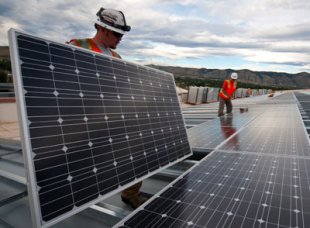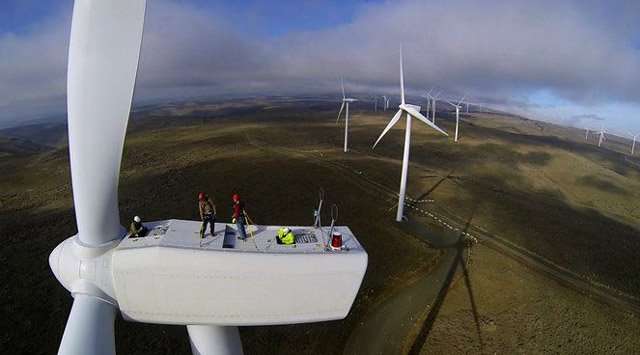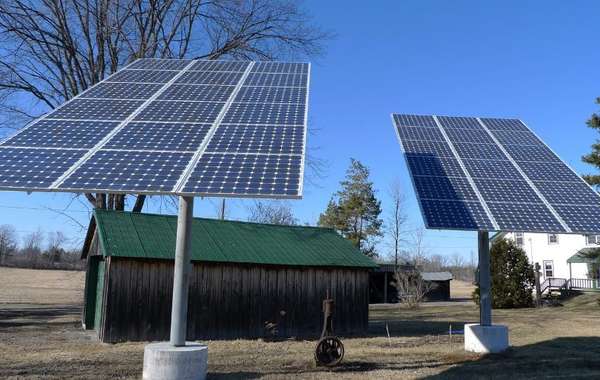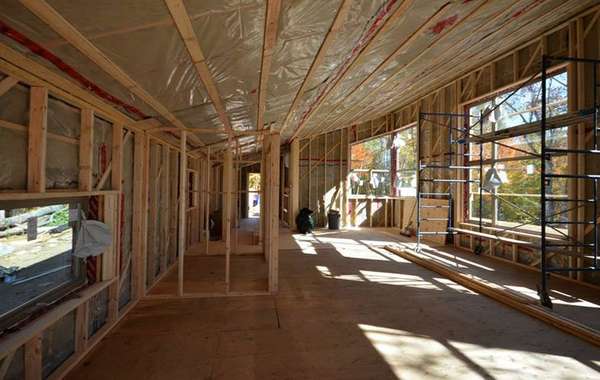Learn how the Ontario Climate Change Action Plan can benefit you directly.
In June 2016, the Ontario government adopted a new Climate Change Action Plan to reduce greenhouse gas emissions from the transportation, industry and building sectors. This will be backed by an investment of $ 1.9 billion annually over the next five years to transition to cleaner fuel sources.
 |
|
Installing solar panels © Dennis Schroeder.
|
This initiative is intended not only to reduce emissions, but to stimulate growth by creating 'green' jobs in a low-carbon global economy. And whether or not you believe in or care about climate issues, smart businesses stay on top of trends, and there is no doubt that there is one happening here. Fuels perceived as 'dirty' are already at a disadvantage in the global market and that is only going to continue. This type of investment can put a province in a much better market position in a quickly changing world economy.
If all Canada has to offer the energy market comes with pipelines and tailings ponds, we won't be a global competitor in the future. We need to up our game in renewable energies or be left out, so way to go Ontario.
Here is a brief look at various initiatives by topic.
TRANSPORTATION
-
Helping citizens transition to electric vehicles (discounts of up to $14,000) Compact electric vehicle image via Creative Commons
Compact electric vehicle image via Creative Commons - Developing infrastructure for public transportation
- Expanding bicycle paths and bicycle parking
Note: Within this a target has been identified (hopeful perhaps), that 12% of new vehicle purchases by the year 2025 will be electric. Read this guide to find out about electric vehicle charging, and the best places to charge EVs in public places.
RESIDENTIAL BUILDINGS:
-
Grants for homeowners to invest in solar and geothermal systems Blower door tests to measure air leakage will be part of home energy rating © Ecohome
Blower door tests to measure air leakage will be part of home energy rating © Ecohome - Financial incentives for the purchase of energy efficient houses
- Establishing a mandatory energy rating for homes (fear not homeowners, inspection budgets will be paid for by the governmentt)
- Implementing energy retrofit programs for residential property owners
Note: The Plan also includes a commitment to ensure that by 2030 all residential buildings being constructed are carbon neutral.
 |
|
Bike lanes © Paul Krueger
|
PLANNING AND LAND
- Oversee the development of communities that are more geared towards walking, cycling and public transportation
- Protect natural areas and agricultural lands from urban sprawl
- Provide financial incentives to replace old wood stoves (northern Ontario in particular)
BUSINESS AND TRADE
- Provide funding and create programs for small businesses so they can improve their energy efficiency and lower overhead costs
- Provide greater access for rural residents to benefit from programs intended to reduce the reliance on fossil fuels
COLLABORATION WITH FIRST NATIONS
- Connect isolated communities to reduce their dependence on diesel
- Test small local grids (biomass, solar, hydro)
RESEARCH AND DEVELOPMENT
- Introduce tax policies to encourage innovation ($375 million investment in research and development of green technologies)
AGRICULTURE, FORESTRY AND LAND
- Establish carbon sequestering programs for farmers
- Plant 50 million trees by 2025
These initiatives will not include restrictions on the use of natural gas, which currently is the heat source for 76% of Ontario homes. The approach is intended to facilitate a smooth transition to greener technologies, not slam one door shut before others are opened.
The five-year Action Plan is based on the 2015 Ontario Strategy on Climate Change. In May 2016, Ontario passed a historic law to help mitigate climate change and move towards a low-carbon economy.
" Under the Climate Change Mitigation and Low-Carbon Economy Act, money raised from Ontario's cap and trade program will be deposited into a new Greenhouse Gas Reduction Account. The account will invest every dollar in green projects and initiatives that reduce emissions."
The Ontario Government will for sure take some hits from the right as another 'Liberal tax and spend' policy, but if you believe in nothing else, this is at the very least a wise business move for the near and distant future given current global market trends.
Despite the fact that some other provinces have much larger networks of renewable energy in place already, no other province has taken such a proactive stance on addressing the elephant in the room - transportation.
Quebec buildings are powered exclusively by renewable hydroelectric energy, as is much of BC and Manitoba and others, but the perceived energy cleanliness of any one of those provinces is shadowed by the fossil fuel gluttony of their transportation sectors. In contrast, Ontario is firing on all cylinders with this undertaking (that really was an unintentional pun) - committing to research and development, public transportation, sensible urban design, along with greater infrastructure and tax incentives for EV purchases.





























Comments (0)
Sign Up to Comment